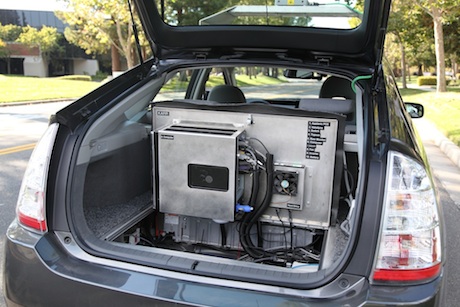Latest In IT Computer & Science & Reserach
New Biometric security systems based on your body movements:-
 Researchers are
trying to discover new ways to enable security based on a person's
body's movements, which, unlike retinal scans and fingerprints, can't be
obtained from them. Scientists at the Carnegie Mellon
University's new Biometrics Research and Identity Automation Lab are
hoping to create passwords that require not just some poorly chosen
combinations of numbers and letters, but the physical presence of a
specific person to unlock. BioSoles are one of the team's
leading concepts: special insoles that can recognize an individual based
upon his or her unique walk. To reach this goal, the team is in the
process of developing a new discipline called "pedo-biometrics," the New
York Daily News reports. According to the report, most
authentication systems need "things you know," but more advanced systems
need "things you are". Fingerprints and retina scans fall into the
latter category but can still be penetrated, by amputating the
corresponding body part.
Researchers are
trying to discover new ways to enable security based on a person's
body's movements, which, unlike retinal scans and fingerprints, can't be
obtained from them. Scientists at the Carnegie Mellon
University's new Biometrics Research and Identity Automation Lab are
hoping to create passwords that require not just some poorly chosen
combinations of numbers and letters, but the physical presence of a
specific person to unlock. BioSoles are one of the team's
leading concepts: special insoles that can recognize an individual based
upon his or her unique walk. To reach this goal, the team is in the
process of developing a new discipline called "pedo-biometrics," the New
York Daily News reports. According to the report, most
authentication systems need "things you know," but more advanced systems
need "things you are". Fingerprints and retina scans fall into the
latter category but can still be penetrated, by amputating the
corresponding body part.
CMU is teaming up with Autonomous ID, a
company based in Ottawa, Canada, to create "things you do" validation,
which no one else can recreate, the report said.
This
collaboration "offers wonderful opportunities for fundamental research
in pedo-biometrics with potential applications in medical diagnosis,
forensic science, privacy, security and automation," said Vijayakumar
Bhagavatula, professor of electrical and computer engineering.
Google's driverless car to come on roads next year:-
 Researchers are
trying to discover new ways to enable security based on a person's
body's movements, which, unlike retinal scans and fingerprints, can't be
obtained from them. Scientists at the Carnegie Mellon
University's new Biometrics Research and Identity Automation Lab are
hoping to create passwords that require not just some poorly chosen
combinations of numbers and letters, but the physical presence of a
specific person to unlock. BioSoles are one of the team's
leading concepts: special insoles that can recognize an individual based
upon his or her unique walk. To reach this goal, the team is in the
process of developing a new discipline called "pedo-biometrics," the New
York Daily News reports. According to the report, most
authentication systems need "things you know," but more advanced systems
need "things you are". Fingerprints and retina scans fall into the
latter category but can still be penetrated, by amputating the
corresponding body part.
Researchers are
trying to discover new ways to enable security based on a person's
body's movements, which, unlike retinal scans and fingerprints, can't be
obtained from them. Scientists at the Carnegie Mellon
University's new Biometrics Research and Identity Automation Lab are
hoping to create passwords that require not just some poorly chosen
combinations of numbers and letters, but the physical presence of a
specific person to unlock. BioSoles are one of the team's
leading concepts: special insoles that can recognize an individual based
upon his or her unique walk. To reach this goal, the team is in the
process of developing a new discipline called "pedo-biometrics," the New
York Daily News reports. According to the report, most
authentication systems need "things you know," but more advanced systems
need "things you are". Fingerprints and retina scans fall into the
latter category but can still be penetrated, by amputating the
corresponding body part. This collaboration "offers wonderful opportunities for fundamental research in pedo-biometrics with potential applications in medical diagnosis, forensic science, privacy, security and automation," said Vijayakumar Bhagavatula, professor of electrical and computer engineering.



California took the fast lane to the future on Tuesday when Governor Jerry Brown signed a law that lets self-driving cars onto public roads.
Brown rode to the signing ceremony at Google headquarters in the passenger seat of a vehicle that steered itself, a Prius modified by Google. Google co-founder Sergey Brin and State Senator Alex Padilla, who sponsored the bill, were along for the ride. An engineer for the technology company, Chris Urmson, sat in the driver's seat, but the car drove itself.
"We're looking at science fiction becoming tomorrow's reality," Brown said just before signing the bill.
Google has been working on self-driving technology since 2010, including testing a fleet of self-driving cars along California roadways.
Google's driverless cars rely on video cameras, radar sensors, lasers and a database of information collected from manually driven cars to help navigation, according to the company.
The new law goes into effect next year and establishes safety and performance regulations for testing driverless cars, provided an operator is ready to take control if necessary.
However, it will likely take years before a fully self-driving autonomous vehicle hits the road, industry official say.
"I think the self-driving car can really dramatically improve the quality of life," said Brin, who pointed to uses ranging from aiding the blind, ferrying revellers who drank too much, to simply making better use of commuting time.
He added that by driving closer together more safely than human-driven cars, self-driven cars might cut congestion.
But Google has no plans to build its own driverless cars.

 Technology has killed the art of conversation among office workers, according to a new poll. Almost 70 per cent of the people quizzed said they preferred to call or email a colleague rather than having a face-to-face conversation with them, even if they were in the same building.
Technology has killed the art of conversation among office workers, according to a new poll. Almost 70 per cent of the people quizzed said they preferred to call or email a colleague rather than having a face-to-face conversation with them, even if they were in the same building. 